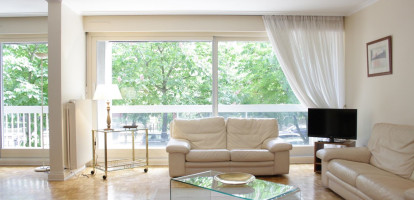What is a French Civil Code leasehold?
The Civil Code leasehold is favored in several cases. The main advantage of the civil code lease is that it allows great freedom to fix the contract's duration and principles. Civil lease model.
Find out how the Civil Code leasehold takes effect for the following real estate transactions:
Everything about the Civil Code Lease: definition and key features
Governed by articles 1708 et seq. ff the Civil Code, the Civil Code leasehold is a so-called “common law” lease, allowing the parties to agree on the contract terms. The drafting of the Civil Code lease is therefore free.
Common law describes the rules applicable to all situations which are not governed by specific rules. It is a general law that applies to everyone, except as provided by law. Concerning the furnished rental lease, the only exceptions by law are abusive clauses and penal clauses.
We also note that the Civil Code lease is subject to technical and energy expertise under the same conditions as the residential lease subject to the law of July 6, 1989.
In summary, the Civil Code leasehold is not subject to specific regulations compared to other residential, professional, and commercial leases that benefit from their rules.
Advantages of renting under a civil lease in Paris
Civil lease: Implications and benefits for owners
The owner retains extensive rights. Thus, the civil code lease applies to owners who do not wish to commit over time. Therefore, the parties agree freely on the duration of the contract.
This contractual freedom is particularly important for owners who, for example, have gone abroad themselves and want to find their apartment when they return; others invested to house their child when he becomes a student. There are many reasons why the owner of a furnished apartment rental in Paris for long-term wishes to keep the freedom to find his property on a given date.
The parties freely fix the amount of the rent of a Civil Code lease. No rent control applies to this type of rental.
Civil lease obligations
As in the classic rental governed by the law of July 6, 1989, the owner also has a responsibility of maintenance and must carry out the works and repairs of his property, other than the rental repairs which concern daily maintenance and small repairs, and are the responsibility of the tenant. Also, the lessor is required:
- to deliver the rented thing to the lessee and, if it is for residential use, to provide a “decent accommodation”;
- to keep the accommodation in condition of being used for the purpose for which it was rented;
- to make the lessee enjoy it peacefully during the term of the lease;
Decent housing corresponds to that which does not affect the health and physical safety of tenants. It must also be " free from pest and parasite infestation » ( Law Élan n ° 2018-1021 of 23 November 2018). The notion of decency is defined by decree n ° 2002-120 of January 30, 2002, which specifies the characteristics which the rented accommodation must respect. This 2002 decree was supplemented by decree n ° 2017-312 of March 9, 2017, which developed an additional criterion of minimum energy performance, this being characterized by airtightness (in addition to airtightness with water since January 1, 2018) and by sufficient ventilation (air renewal and moisture evacuation since July 1, 2018).
Civil lease: What does it mean for tenants?
The “tenant” can use the property for exclusive use, and he must return the property in the state it was in when it came into use. The tenant must also ensure the payment at maturity of the rent, according to the agreed terms.
Nota bene: Employees who benefit from official accommodation must pay the housing tax with respect to this accommodation since they can occupy the accommodation at any time.
Essential clauses of the Civil Lease: detailed content
The following clauses are generally found in a civil code lease:
- Description of the premises;
- The use of the place (official accommodation, secondary home, etc.);
- The duration of the lease determined by the parties, the assignment of the contract and the tacit agreement;
- The amount of the rent and terms of revision;
- Rental charges;
- The security deposit;
- The exclusion from the application of Law No. 89-462 of July 6, 1989;
Applying the Civil Lease to furnished rentals
Civil Code leases are derogatory compared to "classic" leases, such as professional, commercial, and residential leases. Generally, these are exceptional cases where the use of the property is contrary to its nature. For example, renting residential property for professional use, such as corporate housing.
Lease terms and conditions of Civil Lease
The civil code lease allows the duration of the contract to be freely set: the lessor and the lessee jointly define an agreement. You can choose a fixed or indefinite period when signing the lease.
- The open-ended contract ends at the initiative of the lessor or lessee after compliance with a notice period.
- The fixed-term lease may be terminated by simple leave not subject to a deadline, or renewed by tacit agreement, and it may then be interrupted by a simple letter.
Termination and renewal of a Civil Code Lease: Key facts
As the terms of the Civil Code leasehold are fixed by the parties, conditions for termination or renewal differ.
For example, the lease tacitly renews itself for the same duration as the initial one. Yet, the tenant can notify the lessor of his intention to leave the premises at any moment by registered letter with acknowledgment of receipt (AR) or by a bailiff. The lease must, therefore, provide for the notice periods since the civil code contract is unrestricted. A lease of indefinite period ends at the lessor's initiative, or the tenant's one, after a notice period defined at the start. It is customary that the lessor gives a three months notice before the end of the lease and the tenant one month at any time.
In all cases, whether the lease's term is determined or indefinite, the Lessor has no obligation to justify his termination of the rental.
Fixing rent in France under a Civil Code lease: Guidelines
The rent is set freely by the parties. In case of a civil code lease, the owner is not subject to a ceiling or rent control fixed by law.
It is possible to add a rent revision clause according to the indices published by INSEE. For official rentals and secondary dwellings, refer to the rent reference index (IRL).
Civil Code lease vs. Standard residential lease: Key differences
The civil code lease is unrestricted compared to residential rentals governed by Law No. 89-462 of July 6, 1989, which are regulated and less flexible than civil code contracts. Thus, conventional housing leases are compulsory for the principal residence (where the tenant stays at least eight months a year). The Civil Code contract applies in cases where:
- the tenant already has a primary residence (the rental is therefore of secondary residence type);
- the tenant is a business and uses the property for professional purposes (official accommodation);
- the tenant is an employee, but the company pays him an allowance to pay his rent. Thus, his lease is linked to his function, and the lessor would not have rented without this condition. Since the rental is connected to the employment, the civil code leasehold is established, even if the tenant rents for one year and more.
Discover more furnished apartment rentals in Paris under a civil code lease.
Photo by Scott Graham
Writer: Michael HELLEU



 Français
Français

















